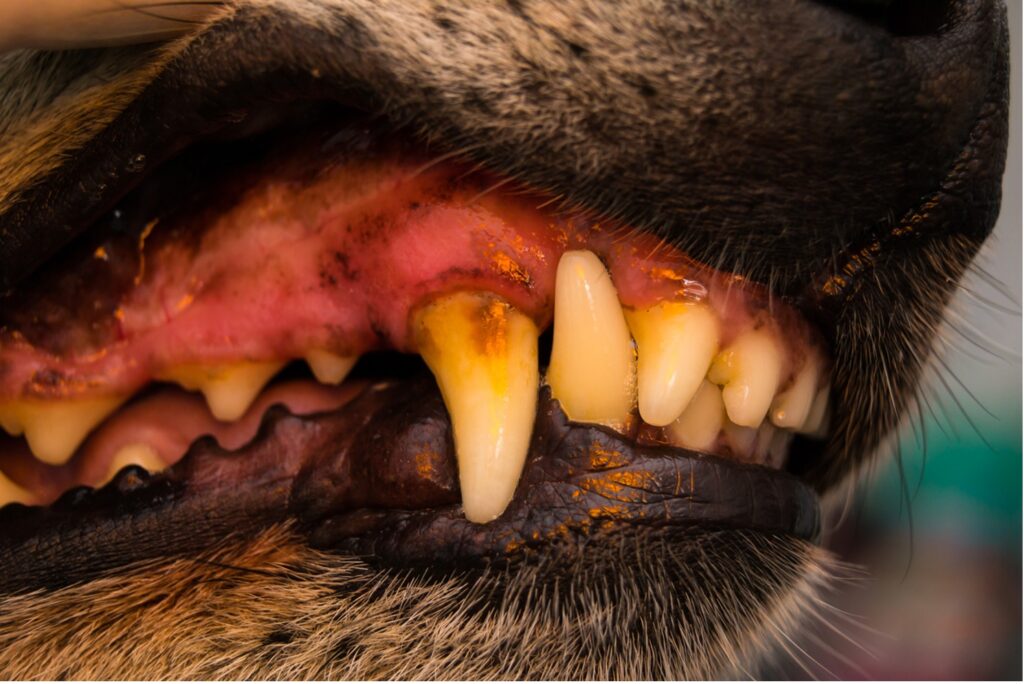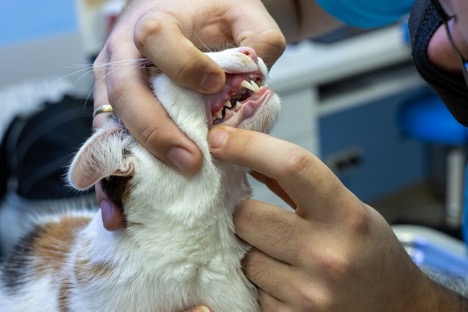Happy Mouths, Happy Pets: What You Need to Know about Pet Dental Health
As devoted pet owners, we go above and beyond to ensure the well-being of our furry companions. From top-notch nutrition to daily walks and loads of affection, we strive to give them the best. Yet, a crucial aspect often slips through the cracks – the essential world of pet dental health. February marks Pet Dental Month, a timely reminder to prioritize our pet’s oral hygiene.
Let’s dive into nurturing dental health in your beloved animal companions and discover why prioritizing your pet’s dental well-being is crucial to your pet’s health and can be a joyous time of bonding more with your pet..
Understanding Dental Issues in Dogs

Dogs, our lovable pals, might not be prone to cavities like humans, but they have unique dental challenges. Dogs can suffer from a variety of dental issues. Some common dental problems in dogs include:
- Gingivitis: Inflammation of the gums is a common early sign of dental issues caused by the accumulation of plaque and tartar on the teeth.
- Periodontal Disease: This disease is an advanced stage of gingivitis in which inflammation extends to the supporting structures of the teeth. It can lead to tooth loss and affect overall health. According to the NIH, “Periodontal disease is one of the most common diseases affecting dogs, with a reported prevalence of at least 80% in dogs over three years of age.”
- Plaque and Tartar Buildup: If not removed, plaque (a sticky film of bacteria) can harden into tartar, leading to various dental issues.
- Broken or Fractured Teeth: Dogs may break or fracture their teeth, especially if they chew on hard objects.
- Oral Tumors: While relatively rare, tumors can develop in the mouth, affecting dental health.
Understanding Dental Problems in Cats

Our feline friends, with their elegance and quirky behaviors all wrapped into one, also experience dental problems. Studies report that up to 90% of cats older than four suffer from some form of dental disease. The good news is that many of these diseases are preventable or treatable with appropriate preventive dental care and monitoring.
Like dogs, cats are susceptible to gingivitis, periodontal disease, cracked teeth, and more rarely, tumors. But there are some other dental diseases that can occur in cats:
- Juvenile Gingivitis: Juvenile gingivitis can occur in young cats as a massive inflammatory response to the eruption of adult teeth. It typically starts between 3 and 4 months of age and can be painful and affect the kitten’s eating ability. We’re not sure why it occurs in pets too young to have lots of tartar on their teeth. It is believed that genetics or their immune system could be too sensitive to bacteria on their teeth.
- Stomatitis: Stomatitis is a severe and painful inflammation of the oral cavity, including the gums, tongue, and back of the throat. Stomatitis can significantly impact a cat’s ability to eat and groom itself.
- Tooth Resorption: The cat’s body begins breaking down and absorbing the structures that form the tooth. This process often starts in the enamel along the gum line and continues toward the tooth’s center. Eventually, the tooth will be almost entirely gone. Tooth resorption is a painful condition that can affect multiple teeth.
Signs of Dental Problems in Dogs and Cats
Pets are masters at concealing their discomfort, making it vital for pet parents to be keen observers. Being proactive can make all the difference in your pet’s dental well-being.
Common signs that indicate your pet may be experiencing dental issues:
- Bad breath: Persistent bad breath, often described as “fishy” or “rotten,” can indicate dental problems in pets.
- Red, swollen, or bleeding gums: Inflamed or bleeding gums may indicate gum disease or other dental issues.
- Difficulty eating or chewing: If your pet is having trouble eating or chewing, it may be due to tooth pain or discomfort caused by dental problems.
- Pawing at the mouth: Pets experiencing dental pain may paw at their mouth to alleviate the discomfort.
- Drooling excessively: Excessive drooling can be a sign of dental issues, especially if accompanied by other symptoms such as bad breath or difficulty eating.
- Changes in behavior: Dental pain can cause changes in your pet’s behavior, including irritability, aggression, or reluctance when you touch around the head and mouth.
If you notice any of these signs in your pet, please contact us so we can examine your pet’s teeth. Early detection and treatment can prevent further complications.
Treatment for Pet Dental Health Conditions
As you can see, various conditions can affect the health of your beloved pet. The more the condition advances, the more aggressive treatment it will require. When we catch dental diseases in their early stages, we can treat them with regular at-home care along with dental cleanings at our hospital. Advanced dental disease may require surgery, tooth extractions, antibiotics, anti-inflammatories, and pain medication. We urge pet parents to be proactive in their pets’ dental care, beginning when they are kittens and puppies and continuing through their senior years.
Pet Parent’s At-Home Care for Pet Dental Health
Preventing dental problems in pets starts in your home. In our blog, Pet Teeth: Dental Care for Your Pets, you can read how to clean your pet’s teeth at home. But here are highlights to keep in mind:
- Brush their teeth once a day with a pet enzymatic toothpaste or tooth wipes.
- Give them dental chews to help maintain clean teeth.
- Provide chew toys that are designed for pet health.
- Keep your pets’ regular dental cleanings at College Hills Veterinary Hospital.
Video: How to Brush Your Pet’s Teeth
Even if you have been brushing your pets’ teeth, we highly recommend watching the American Veterinary Medical Association video presentation. To watch, click on the picture below:
Video: Professional Dental Cleanings
While home care sets the stage for your pets’ dental health, professional dental cleaning is critical to prevent dental diseases. Only professional veterinary dental cleaning can thoroughly remove plaque and tartar buildup on pets’ teeth. Only X-rays can detect problems below the gum line that the naked eye can’t see.
Please click on the picture below to watch the AVMA video on professional pet dental cleanings. You will learn what you need to know about veterinarian dental cleanings.
Why Choose College Hills Veterinary Hospital for Pet Dental Care?
- Experienced Veterinarians:Our team of experienced veterinarians provides the highest quality services.
- Advanced Technology:We use cutting-edge dental equipment, including digital X-rays, to ensure the most accurate diagnosis and treatment.
- Compassionate Care:We understand that dental procedures can be stressful for your pet. Our compassionate approach and gentle handling ensure a stress-free experience.
- Holistic Health:We recognize that good dental health is integral to your pet’s overall well-being. Our professional services support their holistic health.
- Convenient Location:Our clinic is conveniently located in College Station, Texas, making accessing top-tier pet dental care easy.
Conclusion: Our Commitment to Pet Dental Wellness
As we conclude, it becomes abundantly clear that happy mouths lead to happy pets. In our journey together, we’ve uncovered the intricacies of dental care for dogs and cats, understanding their unique challenges and the telltale signs that indicate potential issues.
At College Hills Veterinary Hospital, we are your partners in this journey, offering expert dental care and compassionate support for you and your pet. With our experienced veterinarians, state-of-the-art technology, and commitment to holistic health, we ensure that your beloved companions receive the best possible care.
Let us carry forth the knowledge gained, and the dedication instilled, knowing that by prioritizing your pet’s dental health, you pave the way for a lifetime of joy, vitality, and endless smiles.
Warm regards,
